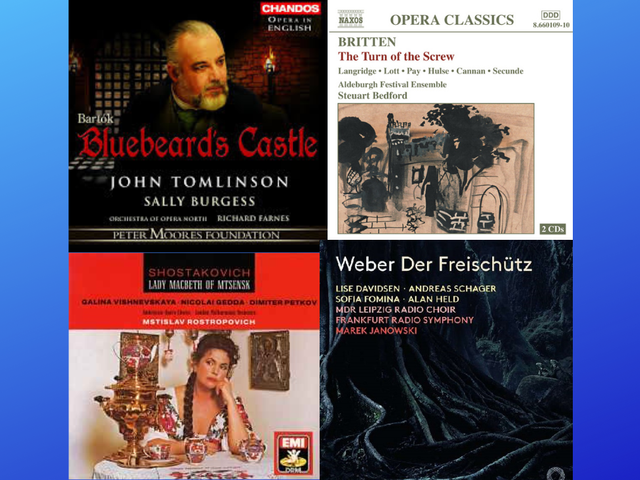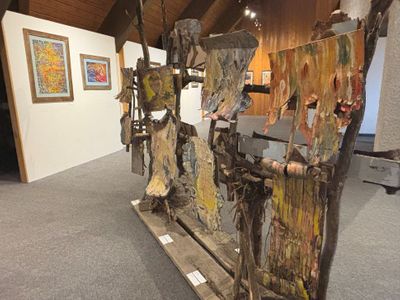Arts & Culture
Weekend at the Opera: Halloween
As Halloween’s ghostly fog settles over Winnipeg, casting shadows and shivers, this week’s edition of Weekend at the Opera on Classic 107 dives into the eerie heart of opera’s darkest tales. Paul Bruch-Wiens of Quadrant Private Wealth and Nolan Kehler guide us through a haunted gallery of witches, ghosts, demons (and other ne’er-do-wells), where music conjures supernatural dread and human darkness. From Verdi’s cursed ambition to Shostakovich’s tragic antihero, these stories weave terror and tragedy into a spellbinding Halloween experience that lingers long past the trick-or-treaters and well into the depths of the night. The Lineup: Opera’s Halloween Haunts We explore five operas, each dripping with the spooky allure of Halloween—supernatural forces, psychological horror, and dark deeds that thrill and unsettle. Here’s the journey – watch your step as you search from door to door… Bartok’s Bluebeard’s Castle (1918) Béla Bartók’s one-act psychological horror opera traps Judith in Duke Bluebeard’s shadowy castle, where seven locked doors hide his gruesome secrets. The score is a descent into the mind’s darkest chambers—door 5’s blood-red lake is a sonic scream of revelation (we wish we had enough air-time to share door 5 with you!) - Overture: A brooding, spoken prelude, heavy with mystery and looming horror (presented in an English translation). .embed-container { position: relative; padding-bottom: 56.25%; height: 0; overflow: hidden; max-width: 100%; } .embed-container iframe, .embed-container object, .embed-container embed { position: absolute; top: 0; left: 0; width: 100%; height: 100%; } Britten’s The Turn of the Screw (1954) Benjamin Britten’s chilling opera, based on Henry James’s ghostly novella, traps us in a mansion where the governess battles the spectral Peter Quint and Miss Jessel, who haunt two children. Its eerie dissonance and innocent melodies create a psychological nightmare that’s pure Halloween terror. · Act 1, variation 7: At Night: A tense ensemble where the governess confronts Quint’s ghostly call to Miles and Flora, blending innocence with menace. .embed-container { position: relative; padding-bottom: 56.25%; height: 0; overflow: hidden; max-width: 100%; } .embed-container iframe, .embed-container object, .embed-container embed { position: absolute; top: 0; left: 0; width: 100%; height: 100%; } Weber’s Der Freischütz (1821) Carl Maria von Weber’s German Romantic masterpiece dives into folklore’s darkest corners. Hunter Max’s pact with the demonic Samiel in the Wolf’s Glen, filled with eerie chants and supernatural effects, crafts a Halloween-worthy tableau of dread and damnation. · “Die Wolfsschlucht”: The chilling Wolf’s Glen scene, where demonic forces and howling winds seal Max’s fate. .embed-container { position: relative; padding-bottom: 56.25%; height: 0; overflow: hidden; max-width: 100%; } .embed-container iframe, .embed-container object, .embed-container embed { position: absolute; top: 0; left: 0; width: 100%; height: 100%; } Shostakovich’s Lady Macbeth of the Mtsensk District (1934) Dmitri Shostakovich’s raw, modernist opera (also known as Katerina Ismailova) follows Katerina, whose murderous passion spirals into chaos. Banned by Stalin, her villainy, driven by desire and desperation, sings through a score that’s both seductive and horrifying, a perfect Halloween descent. · “Nu? Chevo tebye?”: Katerina’s tense soprano aria, plotting murder with fierce resolve. · “Slushay, Sergey...”: Her seductive, menacing plea to lover Sergey, dripping with dark intent. · “Katerina... kto tam?”: A fraught dialogue with Boris, haunted by guilt and paranoia. · “Tepyer shabash”: Katerina’s desperate final outburst, as her crimes collapse in tragic horror. .embed-container { position: relative; padding-bottom: 56.25%; height: 0; overflow: hidden; max-width: 100%; } .embed-container iframe, .embed-container object, .embed-container embed { position: absolute; top: 0; left: 0; width: 100%; height: 100%; } Verdi’s Macbeth (1847) Giuseppe Verdi’s Shakespearean tragedy closes our night with the exiles’ lament for a nation crushed by Macbeth’s tyranny—a haunting reminder that ambition’s cost is eternal. · “Patria oppressa!”: A soaring, sorrowful chorus of the oppressed, mourning a homeland lost to villainy. .embed-container { position: relative; padding-bottom: 56.25%; height: 0; overflow: hidden; max-width: 100%; } .embed-container iframe, .embed-container object, .embed-container embed { position: absolute; top: 0; left: 0; width: 100%; height: 100%; } A big thank you to Quadrant Private Wealth for keeping the music and airwave exploration flowing! Got a favorite opera that gives you chills? Share it on our site or socials! Tune in next Friday at 7 p.m. or Sunday at 4 p.m. on Classic 107, our website, or app for more operatic stories that stir the soul.
























